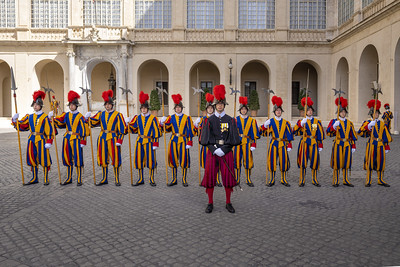Summary | Excerpt | Reading Guide | Reviews | Beyond the Book | Read-Alikes | Genres & Themes | Author Bio

A Novel
by Richard OsmanThis article relates to We Solve Murders
 In Richard Osman's thriller We Solve Murders, a series of murders surrounds Maximum Impact Security, a close-protection agency, or a company that provides bodyguards to paying clients. The concept of employing a select group of individuals to guard an important person isn't a new one by any means. Many believe that this sort of quid pro quo — you protect me, I'll give you [food, tools, money] — has existed as long as there have been humans on the planet.
In Richard Osman's thriller We Solve Murders, a series of murders surrounds Maximum Impact Security, a close-protection agency, or a company that provides bodyguards to paying clients. The concept of employing a select group of individuals to guard an important person isn't a new one by any means. Many believe that this sort of quid pro quo — you protect me, I'll give you [food, tools, money] — has existed as long as there have been humans on the planet.
One early recorded security force is ancient Egypt's Medjai or Medjay. Mentioned in texts from the Old Kingdom (2649-2130 BCE), these were men from Nubia (modern-day Sudan) who were expert archers and horsemen. They developed a reputation for being intensely loyal and trustworthy, and ultimately became the pharoah's bodyguard, also watching over religious sites and accompanying the royal family when they went abroad.
The ancient Macedonians employed a group of bodyguards, too. A corps of elite horsemen known as hetairoi were a part of Philip II's (382-336 BCE) army. Seven men, known as somatophylakes, were selected from this cavalry unit to directly guard the king. This tradition continued under Philip's son, Alexander the Great (356-323 BCE), although one of his soldiers, Peucestas, became the eighth somatophylax as a result of his actions in the Siege of Malli in 325 BCE.
Rome's Praetorian Guard dates back to the second century BCE and was originally a troop of elite soldiers who guarded generals in the field. They were reassigned to the household of the emperor Augustus in 27 BCE, and became a symbol of imperial might for the 300 next years. They even had their own fortress, the Castra Praetoria, on the outskirts of Rome. As the Praetorian Guard's influence increased, they became involved in politics and had a direct hand in selecting several Roman emperors. In one instance, they even conspired with the Roman Senate to murder Emperor Caligula and place his uncle Claudius on the throne. Constantine I dissolved the Praetorian Guard in 312 CE, largely due to their political interference.
The Pope has been protected by the Swiss Guard since 1506. At the time, Italy had been at war for years, with Swiss mercenaries participating on both sides and developing a reputation as fierce fighters. Newly-appointed Pope Julius II requested a force of 200 of these mercenaries, which was paid for by the wealthy German Jakob Fugger (who also loaned money to the Vatican to build St. Peter's Basilica and the Sistine Chapel, among other buildings). It proved to be a wise investment; the Swiss Guard showed their worth during the Sack of Rome in 1527, when 147 out of 189 Swiss Guards died defending Pope Clement VII. To this day, anyone entering the Swiss Guard must be an unmarried Swiss Catholic man between the ages of 19 and 30 and must be at least 5'8.5" tall. In 1981, the Swiss Guards helped protect Pope John Paul II during an assassination attempt.
The monarchs of England also have a long tradition of personal guards. The Yeomen of the Guard was established by King Henry VII after the Battle of Bosworth Field, in 1485. These men provided physical security, always present with the ruler, following them from chamber to chamber and standing outside doors and in halls; they were also food testers. In addition, the King's Guard (known as the Queen's Guard when the monarch is female) was established in 1656, originally to protect Charles II while he was in exile. Today, the Yeomen of the Guard serves a mostly ceremonial role while the King's Guard is responsible for protecting Buckingham and St. James Palaces.
Members of the Swiss Guard in Vatican City
Photo by Ron Przysucha, U.S. Department of State
Filed under Cultural Curiosities
![]() This "beyond the book article" relates to We Solve Murders. It originally ran in September 2024 and has been updated for the
May 2025 paperback edition.
Go to magazine.
This "beyond the book article" relates to We Solve Murders. It originally ran in September 2024 and has been updated for the
May 2025 paperback edition.
Go to magazine.
Your guide toexceptional books
BookBrowse seeks out and recommends the best in contemporary fiction and nonfiction—books that not only engage and entertain but also deepen our understanding of ourselves and the world around us.